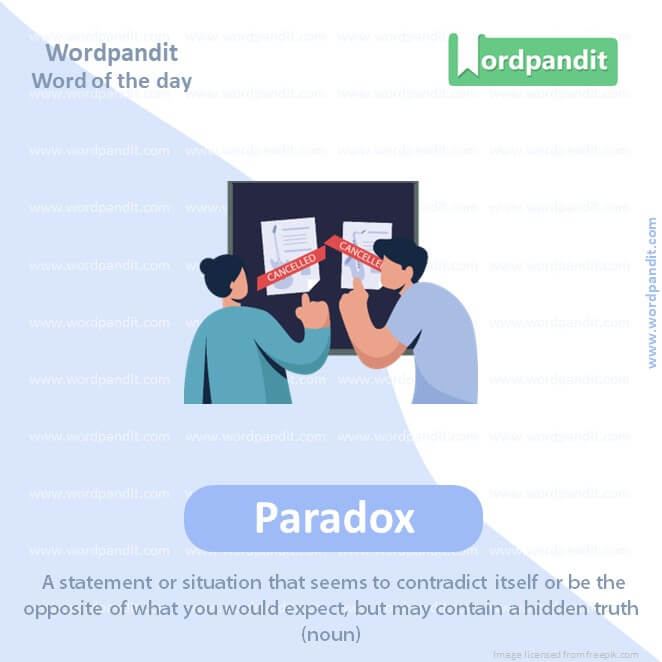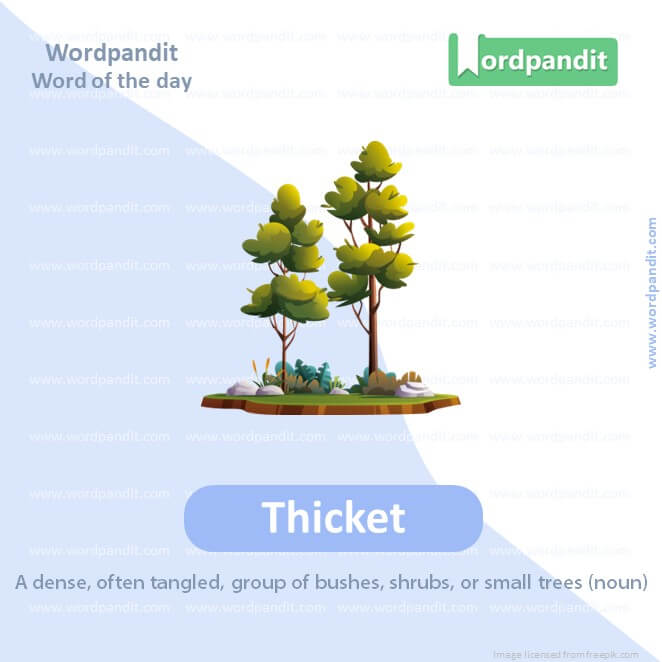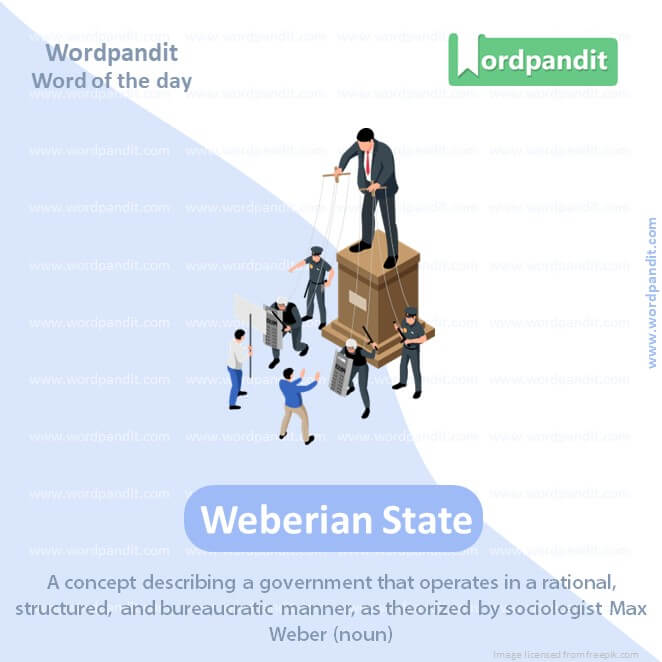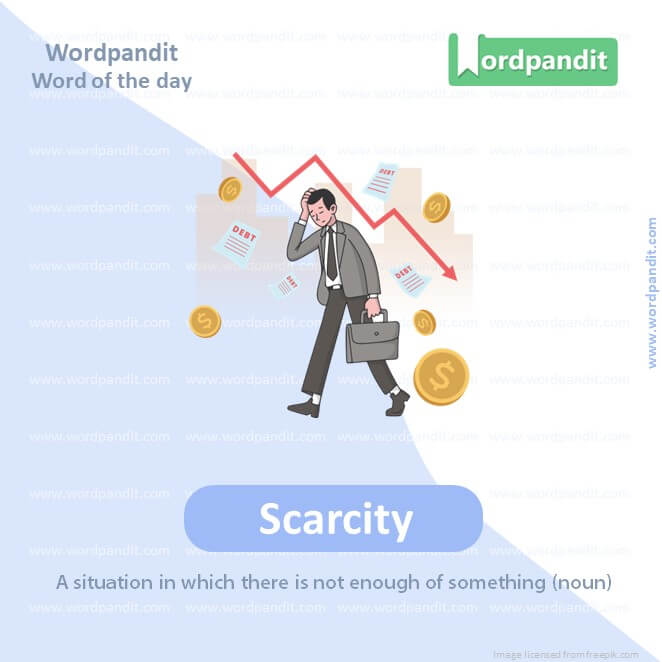Daily Vocabulary Words: List of Daily Used Words
Hi there. Welcome to this special section @ Wordpandit.
Our endeavour here is straightforward: highlighting important daily vocabulary words, you would encounter in The Hindu. This is your repository of commonly used words; essentially, we are posting a list of daily used words. Hence, this has significant practical application as it teaches you words that are commonly used in a leading publication such as The Hindu.
Visit the website daily to learn words from The Hindu.

WORD-1: Paradox
CONTEXT: The Indian state is a paradox of too big and yet too small. Try setting up a business or building a house in an urban area, and you will quickly realise how the thicket of the licences, permits, clearances, and permissions can make life impossible. Even as an ordinary citizen, one can never be sure to be on the right side of the law and the circuitous regulations.
SOURCE: The Hindu
EXPLANATORY PARAGRAPH: Imagine you have a box that is empty but someone says it’s full of invisible things. That’s a paradox! It’s like a puzzle in words where something seems silly or impossible, but it could be true in a special way.
MEANING: A statement or situation that seems to contradict itself or be the opposite of what you would expect, but may contain a hidden truth (Noun).
PRONUNCIATION: PAIR-uh-dox
SYNONYMS: Contradiction, Anomaly, Enigma, Oxymoron, Conundrum, Puzzle.
USAGE EXAMPLE:
1. “This is the famous paradox: ‘I always lie’ is a paradox because if it’s true, it must be false.”
2. “The paradox of being alone in a crowded room fascinated her.”
3. “In a strange paradox, the medicine made him feel sicker before he got better.”
4. “The paradox of her personality was that she was shy in public but very outgoing with friends.”

WORD-2: Thicket
CONTEXT: The Indian state is a paradox of too big and yet too small. Try setting up a business or building a house in an urban area, and you will quickly realise how the thicket of the licences, permits, clearances, and permissions can make life impossible. Even as an ordinary citizen, one can never be sure to be on the right side of the law and the circuitous regulations.
SOURCE: The Hindu
EXPLANATORY PARAGRAPH: A thicket is like a secret little forest inside a forest. It’s a bunch of bushes, trees, and plants all growing very close together, making it look like a thick, tangled wall of green.
MEANING: A dense, often tangled, group of bushes, shrubs, or small trees (Noun).
PRONUNCIATION: THIK-it
SYNONYMS: Brushwood, Coppice, Underbrush, Shrubbery, Brush, Tangle.
USAGE EXAMPLE:
1. “The rabbit darted into the thicket to hide.”
2. “They had to cut through the thicket to reach the clearing.”
3. “Birds chirped from within the dense thicket.”
4. “Exploring the woods, they found a mysterious path leading through a thicket.”
WORD-3: Circuitous
CONTEXT: The Indian state is a paradox of too big and yet too small. Try setting up a business or building a house in an urban area, and you will quickly realise how the thicket of the licences, permits, clearances, and permissions can make life impossible. Even as an ordinary citizen, one can never be sure to be on the right side of the law and the circuitous regulations.
SOURCE: The Hindu
EXPLANATORY PARAGRAPH: Imagine you want to get to your friend’s house, but instead of going straight there, you take a long, twisty way around. That’s circuitous! It means not going straight to a place but taking a longer, curvy route.
MEANING: Not direct or straight to the point, often longer than the most straightforward way (Adjective).
PRONUNCIATION: sir-KYOO-i-tus
SYNONYMS: Indirect, Roundabout, Winding, Meandering, Serpentine, Zigzag.
USAGE EXAMPLE:
1. “The circuitous path through the park was scenic but time-consuming.”
2. “His explanation was circuitous and confusing.”
3. “They took a circuitous route to avoid traffic.”
4. “The novel’s plot was circuitous, with many unexpected twists.”

WORD-4: Weberian State
CONTEXT: At the same time, the Weberian state in India is too small. In the G-20 group, the country has the smallest number of civil servants per capita. The public sector share in total employment in India (at 5.77%) is half the corresponding figures for Indonesia and China, and just about a third of that in the United Kingdom.
SOURCE: The Hindu
EXPLANATORY PARAGRAPH: Imagine a country where there are rules for everything and people who make sure these rules are followed. A Weberian State is like this, where the government works in a very organized way, and there are clear jobs and rules for everyone.
MEANING: A concept describing a government that operates in a rational, structured, and bureaucratic manner, as theorized by sociologist Max Weber (Noun).
PRONUNCIATION: WAY-beer-ee-an State
SYNONYMS: Bureaucratic State, Rational State, Organized Government, Systematic Administration, Structured Government.
USAGE EXAMPLE:
1. “The Weberian State model emphasizes efficiency and impartiality in administration.”
2. “In a Weberian State, officials are chosen based on their qualifications.”
3. “The transition towards a Weberian State improved the country’s governance.”
4. “He studied the evolution of the Weberian State in modern societies.”
WORD-5: Pales
CONTEXT: With approximately 1,600 per million, the number of central government personnel in India pales in comparison to 7,500 in the United States. Similarly, the per capita number of doctors, teachers, town planners, police, judges, firefighters, inspectors for food and drugs, and regulators is the lowest even among countries at a similar stage of development.
SOURCE: The Hindu
EXPLANATORY PARAGRAPH: Think about a bright color slowly becoming less bright. When something pales, it’s like that. It means becoming less strong, less bright, or less noticeable.
MEANING: To become weaker, less intense, or less noticeable (Verb); also can refer to a boundary or fence made of wooden stakes (Noun).
PRONUNCIATION: PAYLS
SYNONYMS for Verb: Fades, Diminishes, Weakens, Dulls, Subsides, Wanes.
SYNONYMS for Noun: Stakes, Fence, Posts, Barrier, Enclosure.
USAGE EXAMPLE for Verb:
1. “Her enthusiasm paled when she heard the news.”
2. “The paint on the walls paled in the sunlight over the years.”
3. “Their achievements paled in comparison to his.”
4. “They built pales around the garden to keep animals out.”

WORD-6: Scarcity
CONTEXT: The Indian state is relatively small on the other metrics, such as the tax-GDP ratio and public expenditure-GDP ratio. Be it public goods provisions, welfare payments, or the justice system, it is a story of scarcity rather than surplus.
SOURCE: The Hindu
EXPLANATORY PARAGRAPH: Scarcity is like when there are only a few cookies left, and everyone wants one. It means there isn’t much of something, and a lot of people want or need it.
MEANING: A situation in which there is not enough of something (Noun).
PRONUNCIATION: SKAIR-si-tee
SYNONYMS: Shortage, Lack, Insufficiency, Deficit, Paucity, Dearth.
USAGE EXAMPLE:
1. “Scarcity of water in the region led to drought.”
2. “Due to its scarcity, the rare gem was extremely valuable.”
3. “The scarcity of jobs caused economic difficulties.”
4. “Her unique skills are in scarcity in the industry.”

WORD-7: Inadequate
CONTEXT: Due to an inadequate state capability, governments at the Centre and States end up outsourcing services that are better provided by the public sector, such as primary health.
SOURCE: The Hindu
EXPLANATORY PARAGRAPH: Imagine trying to fill a big cup with a small amount of water. Inadequate means there’s not enough of something or it’s not good enough for what is needed.
MEANING: Not sufficient or good enough for a specific purpose or need (Adjective).
PRONUNCIATION: in-AD-i-kwut
SYNONYMS: Insufficient, Deficient, Lacking, Poor, Unsatisfactory, Subpar.
USAGE EXAMPLE:
1. “The space in the car was inadequate for their luggage.”
2. “His response to the problem was inadequate.”
3. “They criticized the inadequate funding for the project.”
4. “Her skills were inadequate for the job’s demands.”
WORD-8: Outsourcing
CONTEXT: Due to an inadequate state capability, governments at the Centre and States end up outsourcing services that are better provided by the public sector, such as primary health.
SOURCE: The Hindu
EXPLANATORY PARAGRAPH: Imagine your mom asks you to clean your room, but you ask your friend to do it for you. That’s like outsourcing! It means getting someone else to do work that you or your company needs done.
MEANING: The practice of having certain job functions done outside a company instead of having an in-house department or employee handle them (Noun).
PRONUNCIATION: OUT-sor-sing
SYNONYMS: Subcontracting, Farming out, Contracting out, Externalizing, Offshoring, Delegating.
USAGE EXAMPLE:
1. “The company considered outsourcing their customer service department.”
2. “Outsourcing IT services can be cost-effective.”
3. “He disagreed with the decision to outsource manufacturing.”
4. “Outsourcing has become common in many industries.”
WORD-9: Officialdom
CONTEXT: The proponents of inclusive development rightly pitch for a bigger role for the state — increased public spending on health, education, social security and a larger officialdom to go with it. Their detractors, on the other hand, cite innumerable policy failures to argue for a smaller state.
SOURCE: The Hindu
EXPLANATORY PARAGRAPH: Think of a group of people who work for the government or in big offices, making important decisions and rules. Officialdom is like that; it’s all about the people and activities involved in running a place.
MEANING: The people who are in positions of authority in an organization, especially in government (Noun).
PRONUNCIATION: oh-FISH-ul-dom
SYNONYMS: Bureaucracy, Authorities, Administration, Governance, Management, Establishment.
USAGE EXAMPLE:
1. “He had to navigate through officialdom to get his permit.”
2. “Officialdom often moves slowly when making decisions.”
3. “She became frustrated with the red tape of officialdom.”
4. “Officialdom was not prepared for the crisis.”
WORD-10: Detractors
CONTEXT: The proponents of inclusive development rightly pitch for a bigger role for the state — increased public spending on health, education, social security and a larger officialdom to go with it. Their detractors, on the other hand, cite innumerable policy failures to argue for a smaller state.
SOURCE: The Hindu
EXPLANATORY PARAGRAPH: Imagine if someone always said your drawings weren’t good, even when they were nice. Detractors are like that; they are people who do not like something and often speak against it or criticize it.
MEANING: People who criticize something or someone, often unfairly (Noun).
PRONUNCIATION: dih-TRAK-ters
SYNONYMS: Critics, Opponents, Naysayers, Skeptics, Disparagers, Cynics.
USAGE EXAMPLE:
1. “Despite detractors, she continued her work with confidence.”
2. “The new policy had as many supporters as detractors.”
3. “Detractors of the plan voiced their concerns loudly.”
4. “He ignored his detractors and proved them wrong with his success.”
Vocabulary Meaning
In the ocean of language learning, ‘vocabulary meaning’ is akin to the colorful coral reefs that add depth and vibrancy to communication. Yet, infusing our interactions with this vibrancy is often a challenge for many language learners. The crux lies in effectively deciphering and employing the ‘vocabulary meaning’.
Learning ‘vocabulary meaning’ isn’t about merely gluing words to their definitions. It’s about forming a deep understanding and connection with these words that transcends rote learning. To gain a comprehensive grasp of ‘vocabulary meaning’, one needs to navigate beyond textbook definitions and commit to exploiting diversified resources such as novels, films, music, articles, and digital content. This allows one to encounter vocabulary in a variety of contexts and actual usage, giving deeper insight into their meaning.
However, understanding ‘vocabulary meaning’ involves another essential aspect—memory retention. Techniques such as spaced repetition and the Leitner System offer effective methodologies to maintain and consolidate the ‘vocabulary meaning’. Additionally, leveraging mnemonic strategies can help etch words into your memory by linking them with unique stories or imagery that are personal and easily recallable.
Another way of mastering ‘vocabulary meaning’ is by immersing yourself in the language. Engage in regular conversations with native speakers if possible or utilize language exchange platforms to practice your skills. This not only bolsters your understanding of how the vocabulary is used but also helps articulate the ‘vocabulary meaning’ in the societal and cultural contexts.
In conclusion, gaining a robust grasp of ‘vocabulary meaning’ is a journey rather than an end goal. It requires dedication, perseverance and most importantly, a multi-faceted approach that includes diversified resources, effective memory strategies, and real-life application. With these strategies in place, the depths of ‘vocabulary meaning’ are no longer daunting but become an enchanting exploration of language.













